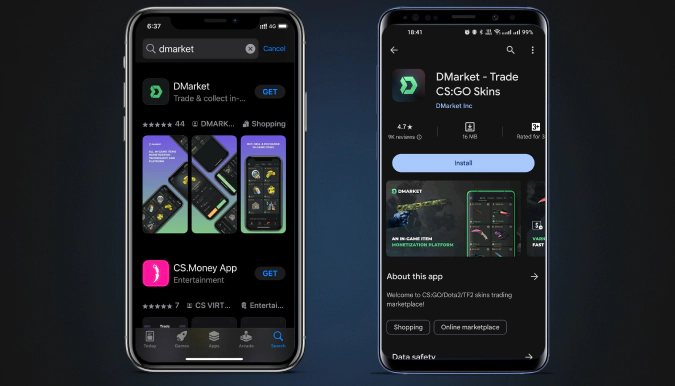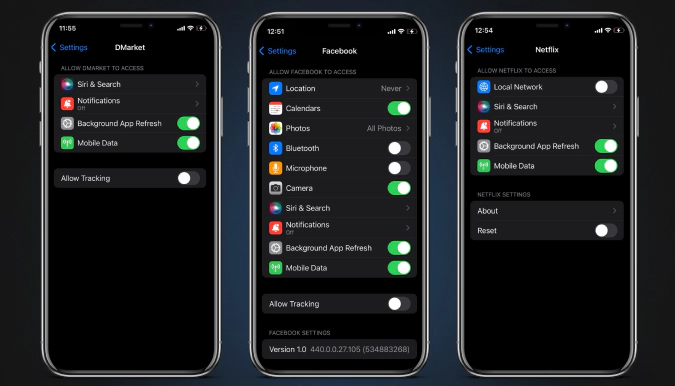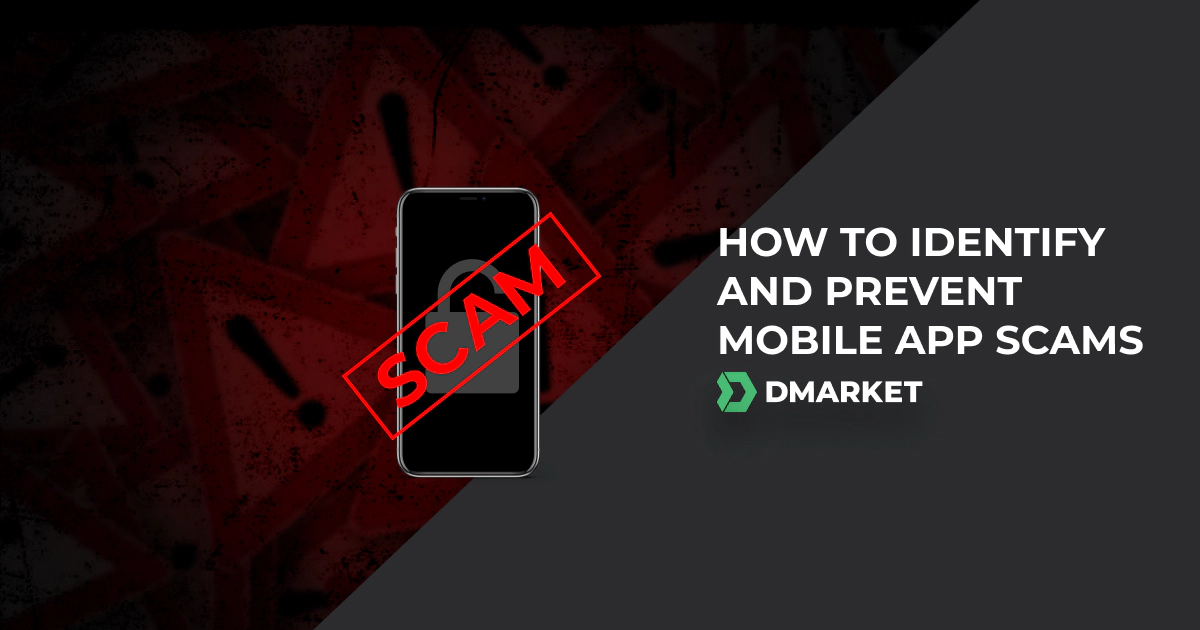Navigating the Risks: How to Identify and Prevent Mobile App Scams
Bringing a digital dimension to our lives has so many positive aspects, like playing video games online with friends or trading skins for cash. But there are also some downsides. We’ve become more vulnerable to digital crimes, and the value of thefts has significantly increased.
People who hunt for sensitive information are called scammers. They deceive their victims to access important accounts and inventories. The further into digitalization we move, the more skillful scammers become. It would be more accurate to just call them thieves.
One of the scam methods they use is to trick someone into installing a malware application on their phone. Considering how amazingly advanced these devices are, it’s a very dangerous scheme. Your smartphone is a gate to almost everything, from your private chats to your bank account. Installing an unknown application with the risk of delivering all sorts of data directly to scammers? This definitely sounds like a very bad idea.
Surprisingly, this scam method works, and it’s especially dangerous in the area of game items trading. As we at DMarket continue to work on the safety of our community, let’s take a look at the scams through mobile apps—with the view to protect yourself from them.
Another big article on DMarket blog describes various basic rules of your digital safety in the skins trading industry. Check out our essential anti-scam checklist.
Why Official Stores Are Safer
The very basic thing to understand is that every app on your phone may potentially interfere with all sorts of data transfers. Everything you type on that digital keyboard, everything you keep on the smartphone’s storage, and every piece of info you send from your phone to a server on the internet can be “caught” by a seemingly innocent application you’ve installed carelessly. Thank goodness there are reliable protective walls.
First of all, we have trustworthy companies and services, who gain bigger revenue by keeping their loyal customers. They don’t want to scam you, and they don’t want to let anyone else steal from you either. No, not because their moral principles are so high; don’t get this illusion. They just get more money by playing fair.
Then, we have official application stores from the companies that develop operational systems for your smartphone. Google and Apple are the biggest, and they are not interested in getting your skins (even if it’s a Dragon Lore). They treasure the reputation of Android and iOS as being a safe environment for end-users. They will do everything in their abilities to not let scammers spread their malware apps through Google Play and App Store.
A simple conclusion is that it’s always better to install apps from reliable developers/publishers, and from the official stores.
Here are a few concise points to make this statement even more clear. Why are official app stores safer?
- Easy to check the develop/publisher. For example, when you want to install the Steam app, you can quickly make sure it’s from Valve and not a different company that names their application in a similar way. And if you’ve read our article about the most common Steam scams and how to avoid them, you know the importance of having the original Steam app.
- Official verification of developers. App Store and Google Play take steps to make sure that if this account claims to be Valve, they really are from this company and have rights to represent it. This point somewhat expands the previous one. Not only can you check the developer in the most straightforward way possible, but you also know they are who they claim to be.
- Anti-virus protection. Everything you install from the official stores is virus-free, and both Android and Apple take care to keep this protection reliable.
- Curated feedback. It’s easy to read feedback of other users to know all the hidden features of every app on the official stores. And those feedback comments are managed (in the way that users and developers can report them), so it’s difficult for scammers to create fake reviews from fake accounts.

It’s simple to use the official stores. There is no good rebellion spirit or any real benefit from going to pirate-like storage or installing directly from unverified files.
How Scammers Can Get Your Personal Data From Apps
We stated it before, but it is pretty important and worth repeating. Any app on your smartphone can access your data. You are just kind of protected by using official apps and making sure the data doesn’t get into the wrong hands.
- Apps may ask to access your data and you give it mindlessly
- Apps get access by default
- Apps hide what data they access
Both Android and iOS make sure the apps behave themselves. The operational systems generally control what permissions the apps have. These permissions may include access to geolocation, messages, internal storage, and basically everything.
If a scamming app sneaks into your phone, it can hack all the permissions and access sensitive info even from other apps.
There is no need for them to pretend to be Steam or a trading app (even if this is quite useful for direct steals). Scammers give you a game or a voice chat app. But they intentionally go deeper into all the processes on your phone. Then, when you enter your Steam credentials or a skins marketplace login/password (even on a different, reliable app or web browser), that “game” or “chat” tracks the data and delivers it to scammers.
The technical aspects don’t really matter, as we are not teaching scammers here. We just want to highlight how dangerous it is to share your data with scammers. And unauthorized apps from unofficial stores are a direct way to do so.
You never know what processes a scam app activates on your phone. And you may give it permission to access everything with your own hands if you are not careful with pressing various pop-up buttons.
Risks and Consequences of Downloading from Unofficial Sources
Bad things may happen if you mindlessly install everything on your smartphone. Some of those things are just annoying. Some are really dangerous.

- Ads everywhere. Unauthorized apps may create a wave of ads everywhere on your phone. No one likes casino adverts covering the whole screen now and again.
- Data sold to companies. Even big companies hunt for your data, and let’s be honest, not all of our activities on a phone are good to share with the world. Privacy is a nice thing to have. Knowing your shopping habits is important for businesses. But the data sold is not limited to that.
- Game items and the whole inventory lost. Accessing your game and marketplace accounts is a way to make transactions on your account, or change your credentials. A precious skin may be transferred to another account, and there will be no way to return it. The very inventory may be lost forever (including the connected email for 2FA).
- Money lost. Banking applications are generally nicely protected, but if you install something weird on your phone, you can forget about this protection. And then, some money will be secretly transferred from your accounts, and you may not notice that quickly.
- You become a link in the scamming schemes. Resending scams across your circle of friends is only one layer. Then, the bad guys may use you to stay hidden but still do evil stuff from your name. This goes way beyond stealing skins. The FBI may become interested, you know…
How to Recognize and Avoid Mobile App Scams
Don’t worry too much. It’s easy to avoid such scams. Like with everything else, for example a Google Ads scam, your own attentiveness is the best protection.
- Install apps from official stores only. All sorts of proposals like “Let’s play CS2 in our team, but use this specific chat for communication, and it’s not on the App Store” are too suspicious. Just don’t do it and stop that communication.
- Get more info on an app from a smaller/unknown developer. Google it and read what info is available on the internet. Check if there is an alternative from a bigger developer.
- Read feedback directly on the app store. Check feedback on the developer and the app.
- Only give the permissions the app logically needs. Say, a game doesn’t really need to make phone calls for you and read your messages. Don’t give these permissions mindlessly.
- Check the permissions your apps already have. Do they allow themselves more than necessary? Consider deleting them! Do they refuse to run without weird permissions? Consider deleting them!

Problems with scam applications often start when you believe nonsense on the internet. “Oh, this game is gold! You play it, and skins/money fall directly to your account/bank card”. Be reasonable!
“You won five CS2 knives in a lottery (that you never participated in). Just install our app from this file, so we will check if you are eligible to get this prize”. Ignore and block!
Sometimes, you want to hack some annoying limitations, and that also potentially leads to trouble. A game is not available in your region and you install it from unofficial sources. Oh, it’s so risky. You may get the game alright, but you never know what other files/malway were installed on your phone alongside it.
Being an adventurous pirate in the wild world of modern scamming apps is deeply dubious entertainment. As for skins trading, limit your apps to essentials. And for sure, install them from the official stores.
DMarket has an app, and we encourage you to check it out on the App Store and Google Play. Basically everything you need for being involved in the game items trading business is right here.


Treasure your data! Follow simple tips from this article and enjoy the internet, games, and skins trading in a safe environment.


















